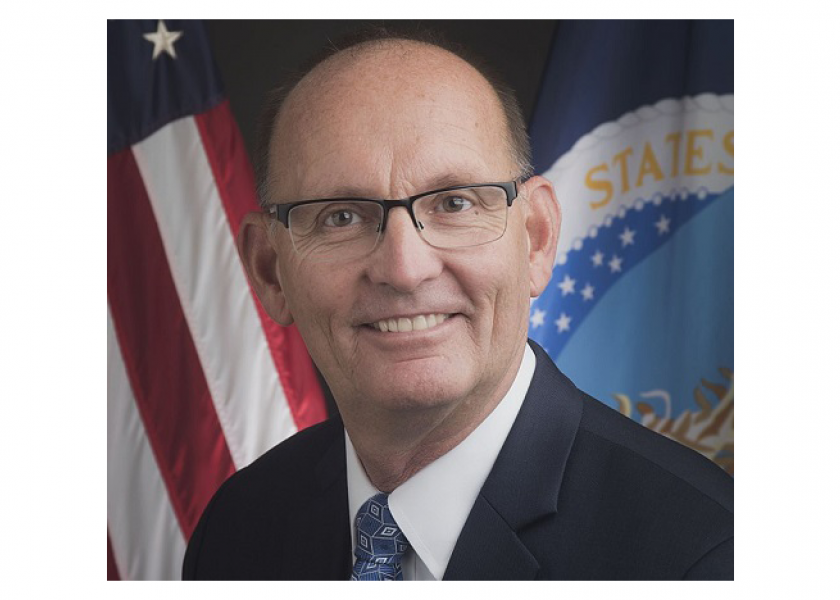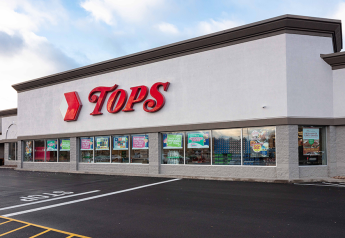Food Box program gaining speed, looking for improvements

Moving about 1 million boxes a day to food banks and other charities, the U.S. Department of Agriculture’s Farmers to Families Food Box Program is gaining speed and is on track to hit 44 million boxes delivered by the end of June.
Greg Ibach, the USDA’s Under Secretary for Marketing and Regulatory Programs, said about 11.4 million food boxes have been moved and invoiced as of June 11, and the agency is gearing up for a second round of contract awards for the program. Some new contracts will be approved by mid- to late June, he said.
“We’re very proud of this program, and we think that it’s doing a marvelous job of accomplishing the three goals that we established the program to accomplish,” he said, noting the program was established in just 40 days.
The Farmers to Families goals are to help producers, give business to the food distribution system and provide food to Americans hit by job losses during the COVID-19 crisis, he said.
The USDA has received thanks from farmers, distributors, food banks, charities, and individuals who have picked up boxes to feed their families, Ibach said.
“We have had (farmers) that have told us that we have already stabilized the market because of the food box program, and some of the distributors have been able to bring employees back to work because they have something to do,” he said.
Nearly 200 firms received contracts May 8 to distribute more than $1.2 billion of fresh produce, dairy products and precooked meat to food banks and similar operations.
About 600 companies made bids for contracts in the first round.
Many well-known produce companies received awards but there were questions how firms without any background in the industry, without a Perishable Agricultural Commodities Act license, and lacking warehouses, coolers and trucks could receive multi-million-dollar contracts.
“There are circumstances where I think there were people that were surprised that they didn’t get a contract, but there were a lot of people that were pleasantly surprised,” Ibach said. “We were able to award contracts to a lot of small, local and regional distribution groups that are working very closely with churches, faith-based organizations, nonprofits that are local and are doing a lot of good,” he said.
Importantly, he said those groups are purchasing from local farmers, he said.
“Even though there were people who thought they were a shoe-in for some of these contracts, we’ve had some great success with the people that were awarded the contracts, at the end of the day,” Ibach said.
Improvement process
On May 11, United Fresh sent 15 questions about the process of awarding contracts to Bruce Summers, administrator of the USDA’s Agricultural Marketing Service, which oversees the Farmers to Families Food Box Program. On May 14, the United Fresh Produce Association and Produce Marketing Association asked the USDA to include them in any revisions or evaluations of the Farmers to Families Food Box Program.
Ibach said the agency is listening to the industry about how the program can be improved.
“We know that the program has room for improvement, and we’re taking input from the industry and (others) across the board to make those improvements,” he said.
“We look forward to the next few months and into the fall to be able to continue to develop the program and to deliver boxes, to help farmers and help distributors.”
So far, two of the 198 contracts awarded May 8 have been terminated, Ibach said, one of which was by request of the company. The USDA started termination proceedings against the other one, Ben Holtz Consulting, which received a $40 million contract, less than two weeks after the awards were announced.
The attention is now shifting to the next round of contract awards, Ibach said.
“We’re entering the phase where the first contracts are supposed to be completed by June 30,” he said.
“There will be some of those contracts from the extremely good performers that we will extend, and there will be other contractors that we will work with to make improvements to their contracts prior to extending, and there will be cases where we open up a new Request for Proposal to be able to address the needs that are out there.”
Ibach said the next round of awards may stipulate that the food boxes are labeled to show they are part of the Farmers to Families Food Box Program.
With $1.2 billion awarded so far, Ibach said there is money left to spend in July and August and perhaps beyond from the $3 billion allocated to the program.
Ibach said the agency has a post-award review process that he believes has increased confidence in the program. For example, the agency makes sure that firms are using only domestic produce in the program.
“(Using domestic produce) is really a foundational requirement,” he said, noting some contractors thought imported produce could be eligible.
Contractors have worked to adjust their boxes to match what is in the market, he said.
Contractors who don’t meet the terms of their contract could be terminated, while others that earlier applied and failed to win a contract could get a second look, he said.
“We’re working right now with some applicants that were unacceptable, maybe based on a technicality or something that was easily curable about their application, that are in areas we consider to be under-served right now,” Ibach said. “I think over the next week and the week following, there will be a series of announcements of contract extensions, new contract awards, and requests for proposals.”
Looking ahead
The Farmers to Families Food Box Program has been a very good experience, said Sabrina Bosiacki, agriculture industry manager for the Houston Food Bank, which is receiving 1.6 million to 1.9 million pounds of food a week from 13 vendors through the program.
“The availability of the mixed boxes has been a great help for not only making sure that we can sustain our increased distribution levels, but also helps us get food into the hands of our clients faster,” she said in an e-mail.
“With no necessary mixing or prep work, it is making a huge impact on the amount of time the product spends in the supply chain at (the food bank). It looks like the USDA will be extending through August, and I’m looking forward to seeing what the program may look like moving forward.”
Bosiacki said the Houston Food Bank recently started working with CR8AMEAL, the Farmers to Families program from CRE8AD8. The San Antonio events planner has received attention in the industry and press for the $39 million contract it received even though it had no Perishable Agricultural Commodities Act license (it does now).
Thomas Kovacevich III, president of T.M. Kovacevich Philadelphia Inc., Philadelphia, said the food box program has worked for the company, which was awarded $2.05 million to distribute produce boxes to the Mid-Atlantic region.
“It’s been exactly as scripted; it’s been great,” he said June 10.
Kovacevich worked with a blueberry and peach grower-shipper to create the produce boxes.
“My grower is happy and the food banks are tickled, and it’s been a good thing.”
Kovacevich said he hopes his company will receive a contract extension, because there will be plenty of local peaches and blueberries for the program in July and August.
The Packer's COVID-19 Coverage
USDA plans second round of food box contracts
Contractors start work on food box program







